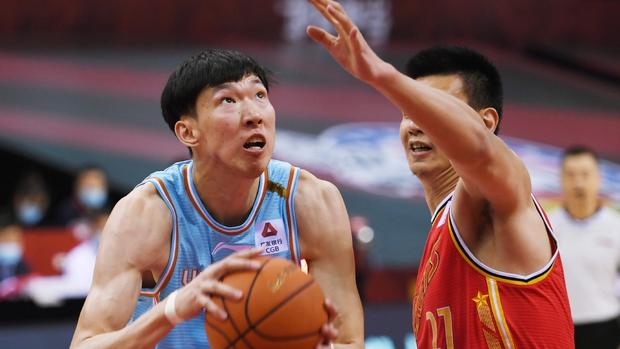 Zhou Qi (left) in action during the CBA match between Xinjiang Flying Tigers and Bayi Rockets in Qingdao, Shandong province, June 22, 2020. (PHOTO / XINHUA)
Zhou Qi (left) in action during the CBA match between Xinjiang Flying Tigers and Bayi Rockets in Qingdao, Shandong province, June 22, 2020. (PHOTO / XINHUA)
With a former championship club withdrawing from the league due to a controversial penalty, the Chinese Basketball Association has found itself in hot water as the dispute keeps taking its toll on the game’s profile.
The Xinjiang Flying Tigers announced on Tuesday that they will quit the country’s domestic basketball league in protest of a decision made by the CBA on Feb 17 to ban the club from signing any new players for a year.
The punishment, as a result of an internal investigation, was imposed over an allegation that the Flying Tigers had been operating under a company not registered with the CBA, which violated league rules that each of the 20 CBA clubs has to run its financial operations, such as salary payment, player transfer, sponsorship and marketing, under a company registered with the association.
However, in a strongly worded statement released on Tuesday, the Flying Tigers denied all of the allegations, calling the penalty “absurd” and “groundless”, while insisting that the club’s registration status was “fair and legal” after having passed the CBA’s preseason club scrutiny for the past three years.
The punishment, as a result of an internal investigation, was imposed over an allegation that the Flying Tigers had been operating under a company not registered with the CBA, which violated league rules that each of the 20 CBA clubs has to run its financial operations, such as salary payment, player transfer, sponsorship and marketing, under a company registered with the association
In a brief response to the decision, CBA President Yao Ming paid tribute to the club’s contribution to the sport’s development in the Xinjiang Uygur autonomous region, but did not reveal any further details.
ALSO READ: CBA imposes one-year transfer ban on Xinjiang
“The Flying Tigers have made great contribution to Chinese basketball over the past 20 years. We respect its decision even though we felt quite regretful about it,” Yao, a Basketball Hall of Famer, told cnr.cn after attending a media event in Beijing on Wednesday. “Our focus now is to bring the league’s competitions back to the fans,” he said.
The CBA’s investigation into the Xinjiang club’s operations was triggered by the club’s former star player Zhou Qi’s heated contract dispute with the Flying Tigers.
Signed by the Flying Tigers from the league’s youth training system in 2014, Zhou, a 2.17-meter center, had developed into one of the league’s most dominant players and a national team starter. After helping the Flying Tigers win the franchise’s first CBA title in 2017, Zhou joined the National Basketball Association’s Houston Rockets, Yao’s former club, which drafted Zhou in 2016 to start a two-year stint in the United States.
However, his desire to seek opportunities elsewhere at home after returning to the CBA in 2019 was denied by the Flying Tigers, which refused to release Zhou as a “free agent”, citing league rules that a club is entitled to keep a player as long as it offers him a new contract that matches any new offers from other clubs.
After staying with the Flying Tigers for two more seasons and playing in Australia in the past two years, Zhou and his agent had discovered that his previous contract with the Flying
Tigers was signed under the name of a different company, rather than the original entity registered with the CBA. They said the club had potentially breached the league’s rules, according to a statement released by Zhou on Wednesday morning.
READ MORE: Zhou Qi returns to NBL's South East Melbourne Phoenix
Should the Flying Tigers quit the league as announced, Zhou is expected to resume his unrestricted free-agent status as early as next season after the deadline for signing up players for the remainder of the 2022-23 season has passed.


